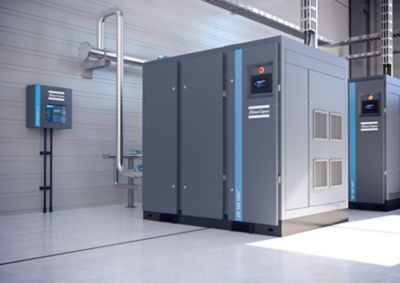Estimated reading time: 3 minutes
Summertime: The word conjures up images of relaxing on the beach and the peaceful lapping of the waves on the shore. Most people associate summer with some level of fun in the sun.
For maintenance staff, however, the warm months can be a stressful time, since the compressors are now increasingly taking unplanned "holidays" in the summer months, even in our part of the world, driving up maintenance and energy costs.
With higher temperatures and higher humidity, summer offers textbook conditions for unexpected compressor failures. Irregularly maintained systems are particularly affected. Unexpected repair costs and loss of production can be the result.
This is how you protect your compressed air system from heat.
1. Improve Compressor Room Ventilation to Prevent Overheating
Adequate and proper ventilation in the compressor room is critical to compressor performance. During the muggy summer months, make sure that air can flow freely around the device and that the recommended ambient temperature is maintained. Repair loose foam or panels and remove any obstructions in or around the device.
2. Use Proper Compressor Oil and Check Oil Levels in Summer
Compressor oil is not immune to the effects of hot weather. Heat, and particularly sweltering heat, can shorten the life expectancy of the oil, which is detrimental to the element of the deviceimpacting cooling performance and risking damage to internal components. Regularly inspect oil levels and quality, replace oil when needed, and keep oil filters clean. Using the right correct oil grade recommended by your manufacturer also helps your compressor run cooler and more efficiently. and keeping oil filters clean will help keep your compressors running cool and using less energy.
3. Inspect and Clean Compressor Coolers and Radiators
Check the quality and functionality of the compressor coolers. Clogged or blocked radiators can cause a compressor to overheat. Inspect the cooling fan, radiators, and heat exchangers for dust and debris that may prevent proper operation. A neglected radiator can clog and must be removed for thorough cleaning - this can not only be time-consuming, but also quite expensive. If you find stubborn buildup a thorough cleaning might be necessary to restore efficient heat transfer.
4. Maintain Condensate Separators to Handle Increased Humidity
The high humidity in summer can cause more condensate to accumulate in a compressor than in the cooler months. Make sure the steam traps are working properly and,and can take the extra water. Make sureAlso, check that the condensate treatment system filters oil before discharge, this protects both your equipment and the environment.is properly filtered to prevent oil from going down the drain.
5. Replace Air and Oil Filters to Keep Systems Efficient
When air filters are dirty, the air flow is restricted, forcing your air compressor to compensate for the pressure drop, . In this case, the compressor has to compensate for the pressure drop, which leads to higher operating temperatures. Oil filters are another matter. The oil quality deteriorates at higher temperatures and leaves larger deposits in the filter. Be sure to replace the air and oil filters on your appliances at the start of summer. With clean filters, your compressor systems run cooler and use less energy.
By following these summer air compressor maintenance tips, you will reduce the risk of unexpected downtime, save on energy costs, and extend your equipment’s lifespan.
If you have any questions or need help with the maintenance of your compressor, just contact us.
Discover more about air compressor maintenance
FAQs
How do I stop my air compressor from overheating in the summer?
To prevent your compressor from overheating during hot weather, ensure the room has proper ventilation, keep coolers and radiators clean, use the correct compressor oil, replace air and oil filters, and check that condensate drains can handle higher humidity.
What is the ideal ambient temperature for an air compressor?
Most air compressors are designed to operate best at an ambient temperature between 5°C and 30°C. Temperatures consistently outside of this range can lead to short- and long-term damage to your air compressor.
Does humidity affect my air compressor?
Yes. Higher humidity increases the amount of condensate your compressor produces. This puts extra demand on condensate drains and separators, making regular inspections and maintenance especially important during the summer. Moisture in compressed air can cause corrosion, rust, and other damages to your equipment.

